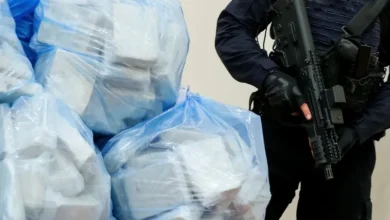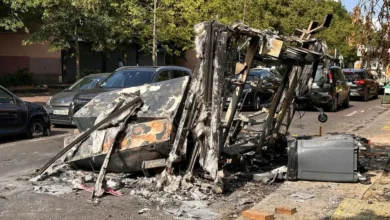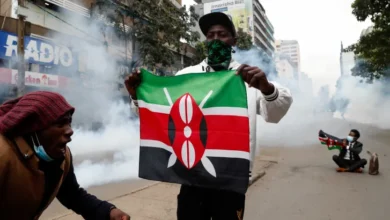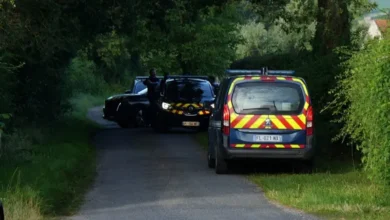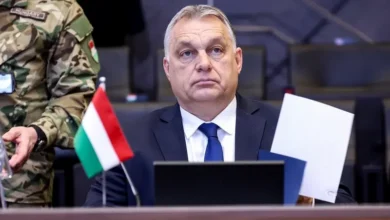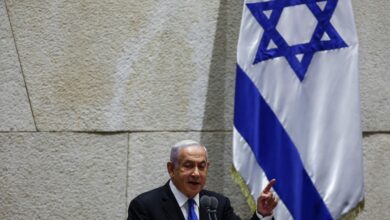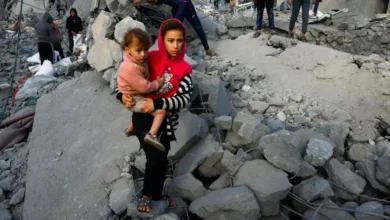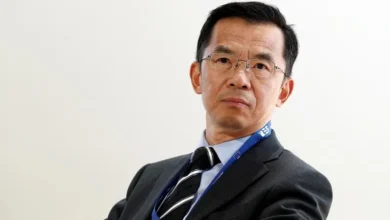Al-Bashir headed the Syrian Salvation Government (SSG) in Idlib province before the 12-day lightning offensive swept into Damascus, toppling longtime leader al-Assad and ending more than half a century of al-Assad family rule. Al-Bashir has close ties to Hayat Tahrir al-Sham (HTS) – the group that led the Damascus takeover – which is tied to the SSG he headed. The SSG, with its own ministries, departments, judicial and security authorities, was set up in the northwest bastion of Idlib in 2017 to assist people in the rebel-held area who were cut off from government services. Al-Bashir also previously held the role of development minister in the SSG. The SSG has begun rolling out assistance in Aleppo, the first major city to fall from government hands after opposition forces began their offensive. A Facebook page of the rebel administration says al-Bashir was trained as an electrical engineer, later received a degree in sharia and law, and has also held posts in education. HTS’s leader Ahmed al-Sharaa, also known as Abu Mohammed al-Julani, met outgoing Prime Minister Mohammed Ghazi al-Jalali on Monday to discuss the transition to a caretaker government.
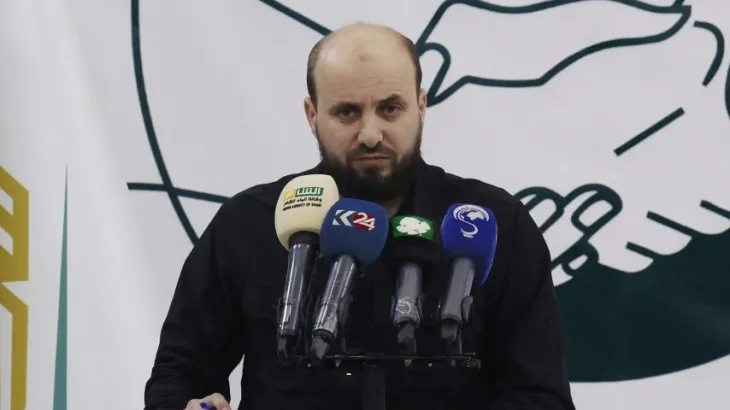
Hamas decries Israeli ‘aggression’ in Syria
The Palestinian group has decried Israel’s “aggression” in Syria, saying Israel is now imposing its crimes on “people of the whole region”.
In a statement, Hamas condemned Israel’s “barbaric bombing of public facilities and properties” in Syria, after Israeli forces carried out dozens of strikes on facilities across the country since al-Assad was overthrown.
Hamas called on the international community to intervene and hold Israel responsible for these actions.
Transitional gov’t brings ‘new hope’ for Syria: WHO chief
The announcement that Mohammed al-Bashir was officially appointed caretaker prime minister of the transitional Syrian government brings “new hope”, the World Health Organization (WHO) said on Tuesday.
“The appointment in the last few hours of transitional government in the Syrian Arab Republic is bringing new hope to a country that has suffered so much,” WHO Director-General Tedros Adhanom Ghebreyesus told reporters in Geneva.
Turkiye destroys YPG trucks carrying Syrian army weapons: Report
Turkiye’s intelligence agency has destroyed 12 trucks loaded with missiles and heavy weapons, two tanks and ammunition stores being transported by the Kurdish YPG militia in northeast Syria, Reuters news agency reports, citing an unnamed Turkish security source.
The source said that the military equipment had been left behind by the armed forces of Syria’s ousted President Bashar al-Assad when they abandoned the area of Qamishli in northeast Syria.
The Kurdish People’s Protection Units (YPG) have been a leader in the coalition of groups that made up the US-backed Syrian Democratic Forces.
The group had been enjoying near-autonomy in northeast Syria, which has been under its control for years.
Disbanding various armed groups a huge task in ‘volatile’ situation
Disbanding the various armed groups in Syria and reconstituting them into a national army will be very difficult as they may have very different ideas of how a future state will look and there are tensions between the groups, Marina Miron, a post-doctorate researcher in the Department of War Studies at King’s College London, told Al Jazeera.
She said it will be particularly difficult to integrate the Kurdish-led Syrian Democratic Forces (SDF), which control swaths of territory in the northeast of Syria, into a centralised army.
“The Kurds might be afraid that they will be suppressed by whatever form the current government takes, and they will not want to cede the territory,” Miron said.
If the Kurdish-led forces are to disband, it will be important for external forces – including Arab and European countries, as well as Turkiye, to ensure that these groups are protected, she noted.
“Even in this scenario, it is unknown to what extent [the SDF] will be willing to collaborate, and this will depend on the perceived legitimacies that the current government can establish.”
Miron also said a small portion of al-Assad’s former army could potentially be integrated into a national force.
“The problem is, these elements of the Syrian Arab Army can also form militant groups, and this can again lead to sectarian violence,” she said.
“The situation is very volatile. We have other groups [who were allied to al-Assad] who are taking refuge in Iraq. And we don’t know what the long-term plan will be.”
Turkiye braces for surge of Syrian refugees heading home
Turkiye has expanded its border crossing capacities to accommodate the surge in Syrian refugees seeking to return home, the interior minister has said.
Following Syrian President Bashar al-Assad’s ouster on Sunday, hundreds flocked to Turkiye’s southern border with Syria, with Ankara quickly moving to expand its crossing facilities, Interior Minister Ali Yerlikaya told reporters.
“Although we had a daily capacity to accommodate 3,000 crossings, we have increased that to between 15,000 and 20,000,” Yerlikaya said.
Turkiye is home to nearly three million Syrian refugees who fled after the start of the civil war in 2011, with Ankara hoping the tectonic shift in neighbouring Syria will allow many to return home.
Yerlikaya said “300-400” people crossed the frontier on Sunday but by midday on Monday, that number had “doubled”.
“We will have a meeting with Syrian NGOs on Wednesday afternoon” about the refugees’ return, he said, without specifying which groups would be involved.
Yerlikaya said that since 2016, “more than 738,000 Syrians” had voluntarily returned home, with a total of 2,935,000 still left in Turkiye.
Blinken urges ‘inclusive’ process for new Syrian government
US Secretary of State Antony Blinken says the United States fully supports Syria’s political transition process and wants it to lead to credible, “inclusive”, and non-sectarian governance that meets international standards of transparency and accountability.
“The transition process and new government must also uphold clear commitments to fully respect the rights of minorities, facilitate the flow of humanitarian assistance to all in need, prevent Syria from being used as a base for terrorism or posing a threat to its neighbors, and ensure that any chemical or biological weapons stockpiles are secured and safely destroyed,” Blinken said in a statement.
“The United States will recognize and fully support a future Syria government that results from this process,” he added.
Israel targeted at least six Syrian navy vessels: Ambrey
British security firm Ambrey says the Israeli military targeted at least six Syrian naval vessels in an attack on the Syrian port of Latakia on Monday.
Ambrey said video footage showed one naval vessel and indicated five others had been sunk without any visible damage being done to the port’s infrastructure.
Syrian security sources told Reuters on Monday that Israel’s military had targeted an air defence installation near Latakia. The attack followed the overthrow of Syrian President Bashar al-Assad by rebel forces.
UK says ban on HTS does not prevent future talks
The fact that Hayat Tahrir al-Sham (HTS), which led the forces that overthrew al-Assad in Syria, is banned in the United Kingdom does not prevent the British government from talking with it in the future, Prime Minister Keir Starmer’s office has said in a statement.
HTS is proscribed in the UK because of its past association with al-Qaeda, but the group’s leader Ahmed al-Sharaa, also referred to as Abu Mohammed al-Julani, cut ties with the group years ago and has sought to present HTS as more moderate and inclusive.
“The fact that HTS is a proscribed terrorist group does not prevent the government from engaging with HTS in the future. There’s no absolute offence of meeting a proscribed organisation,” Starmer’s office said.
Engagement with such organisations “could for example include meetings designed to encourage a designated group to engage in a peace process or facilitate the delivery of humanitarian aid,” it added.
“More broadly we keep proscriptions under review and we’re obviously monitoring the situation closely.”
On Monday, the prime minister suggested that the UK is not considering whether to remove the group from the proscribed list.
Lebanon says will deal with ex-Syrian officials according to law
Amid suggestions online about former Syrian officials being in Lebanon, the office of Lebanese caretaker Prime Minister Najib Mikati has issued a statement seeking to clarify that it would deal with any potential cases based on the law.
The Lebanese government’s policy has consistently adhered to Lebanese and international laws, particularly in the context of Lebanon hosting hundreds of thousands of displaced Syrians, it said in the statement.
Mikati is “closely following” the issue and is in contact with top judicial and security officials, his office said.
It added that any cases will be dealt with by “what is required by the laws and regulations in force, under the supervision of the competent judiciary and in a manner that secures the interests of Lebanon and the Lebanese and the future of relations with the Syrian people”.
Inside Bashar al-Assad’s presidential palace
The opposition groups in Syria have released the footage below from inside the compound of the presidential palace used by the deposed leader.
Israel defence minister confirms overnight strikes on Syria navy
Israeli Defence Minister Israel Katz has confirmed that the military had hit several Syrian naval vessels in overnight strikes.
“The [Israeli military] has been operating in Syria in recent days to strike and destroy strategic capabilities that threaten the State of Israel. The navy operated last night to destroy the Syrian fleet with great success,” Katz said during a visit to a naval base in the northern city of Haifa.
He also warned Syria’s new rulers not to follow al-Assad’s path.
‘For Syrians to come back, they’ll need shelter, education, health and jobs’
We’ve spoken to Gonzalo Vargas Llosa, the Damascus-based representative for the UN refugee agency in Syria, to ask him about the humanitarian situation in the country.
Here’s what he said (his comments below have been slightly edited for brevity):
“I have just come back from the border with Lebanon. I met hundreds of Syrians who are coming back home. It was more than a return; it was a celebration, and it was wonderful to see.
“I spoke to one family – a husband, wife and four children – who are going back to Idlib. The four children were all born in Lebanon because this family has been away for 12 years, and the mother said to me, ‘Finally my four children are going to see their country.’
“So there was jubilation. And it was the same with all the other families who I saw at the border. This is something that is very positive, a moment of great happiness.
“But there are also hundreds of thousands, perhaps millions of Syrians, who are waiting, who haven’t taken the decision that those hundreds that I saw at the border have taken.
“Many of them may actually want to come back but they are waiting. We need to respect the fact that they are waiting, they are considering, they want to know what is going to happen and how the is situation going to evolve.
“I think people expect basically three things in this current context; one, at the political level, they want a transition that is going to keep the peace for a long time; second, at the community level, they want to be sure that when they will go back to their communities, they will be well received, shown tolerance, and there will be co-existence and reconciliation; and third, what they need and expect is to be able to come back and make a decent living – and there we have a huge problem because the humanitarian situation in the country is a catastrophe.
“The responsibility of ensuring a peaceful transition is, of course, with those who are in charge of the country. But the international community also has also a huge responsibility which is to carry out a major injection of humanitarian and economic support.
“What is clear is for people to come back in big numbers and stay, they need shelter, education, health and to be able to have jobs. That is what they are telling us consistently. And that needs to happen very quickly, otherwise, we may lose an opportunity that we and the Syrians haven’t had for 13 years.”
